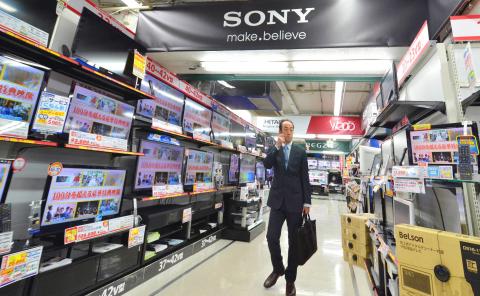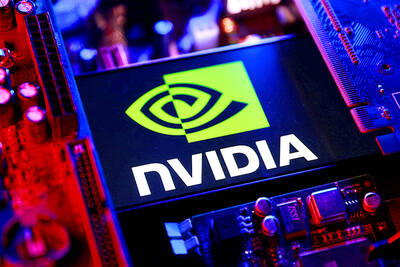A senior Japanese politician hinted yesterday that a government bailout was not on the cards for the nation’s struggling electronics giants, after embattled Sharp cast doubt on its own survival.
Japanese Economy Minister Seiji Maehara said the likes of Panasonic and Sharp, on track to book combined annual losses of more than US$15 billion, should not expect the kind of taxpayer-funded rescue handed to once-bankrupt Japan Airlines or Tokyo Electric Power Co (TEPCO), operator of the crippled Fukushima Dai-ichi nuclear plant.
“In this society of capitalism, I believe companies in general should rebuild themselves through their own efforts,” Maehara told a press briefing in Tokyo.

Photo: AFP
US President Barack Obama came under fire in some quarters over his administration’s bailout of the US auto industry, but the issue is a sensitive one in Japan, where there is a general reluctance to let failing companies go under.
Japan’s electronics industry has suffered from a long list of problems, including a high yen, slowing demand in key export markets, fierce overseas competition and strategic mistakes, which have left the industry’s finances in ruins.
Neither Sharp nor key rivals Panasonic and Sony have sought bankruptcy protection as they undergo massive corporate restructurings.
However, Sharp, which makes Aquos-brand electronics, recently warned of a US$5.6 billion annual loss, its credit rating has been reduced to junk, and the firm itself has raised questions over its viability.
Yesterday, Maehara said that Japan Airlines (JAL), which went bankrupt in one of Japan’s worst-ever corporate failures, was the nation’s flagship carrier and letting it fail would have left rival All Nippon Airways as the overwhelmingly dominant carrier in the domestic market.
Now-profitable JAL went through a court-supervised restructuring and has re-listed its shares on the Tokyo Stock Exchange.
TEPCO will receive billions of dollars in public money amid huge bills stemming from last year’s tsunami-sparked reactor meltdowns at Fukushima Dai-ichi, the world’s worst atomic crisis in a generation.

POWERING UP: PSUs for AI servers made up about 50% of Delta’s total server PSU revenue during the first three quarters of last year, the company said Power supply and electronic components maker Delta Electronics Inc (台達電) reported record-high revenue of NT$161.61 billion (US$5.11 billion) for last quarter and said it remains positive about this quarter. Last quarter’s figure was up 7.6 percent from the previous quarter and 41.51 percent higher than a year earlier, and largely in line with Yuanta Securities Investment Consulting Co’s (元大投顧) forecast of NT$160 billion. Delta’s annual revenue last year rose 31.76 percent year-on-year to NT$554.89 billion, also a record high for the company. Its strong performance reflected continued demand for high-performance power solutions and advanced liquid-cooling products used in artificial intelligence (AI) data centers,

SIZE MATTERS: TSMC started phasing out 8-inch wafer production last year, while Samsung is more aggressively retiring 8-inch capacity, TrendForce said Chipmakers are expected to raise prices of 8-inch wafers by up to 20 percent this year on concern over supply constraints as major contract chipmakers Taiwan Semiconductor Manufacturing Co (TSMC, 台積電) and Samsung Electronics Co gradually retire less advanced wafer capacity, TrendForce Corp (集邦科技) said yesterday. It is the first significant across-the-board price hike since a global semiconductor correction in 2023, the Taipei-based market researcher said in a report. Global 8-inch wafer capacity slid 0.3 percent year-on-year last year, although 8-inch wafer prices still hovered at relatively stable levels throughout the year, TrendForce said. The downward trend is expected to continue this year,

‘BASICALLY A BAN’: Sources said the wording governing H200 imports from officials was severe, but added that the regulations might change if the situation evolves Chinese customs authorities told customs agents this week that Nvidia Corp’s H200 artificial intelligence (AI) chips are not permitted to enter China, three people briefed on the matter said. Chinese government officials also summoned domestic technology companies to meetings on Tuesday, at which they were explicitly instructed not to purchase the chips unless necessary, two of the people and a third source said. “The wording from the officials is so severe that it is basically a ban for now, though this might change in the future should things evolve,” one of the people said. The H200, Nvidia’s second-most powerful AI chip, is one

A proposed billionaires’ tax in California has ignited a political uproar in Silicon Valley, with tech titans threatening to leave the state while California Governor Gavin Newsom of the Democratic Party maneuvers to defeat a levy that he fears would lead to an exodus of wealth. A technology mecca, California has more billionaires than any other US state — a few hundred, by some estimates. About half its personal income tax revenue, a financial backbone in the nearly US$350 billion budget, comes from the top 1 percent of earners. A large healthcare union is attempting to place a proposal before